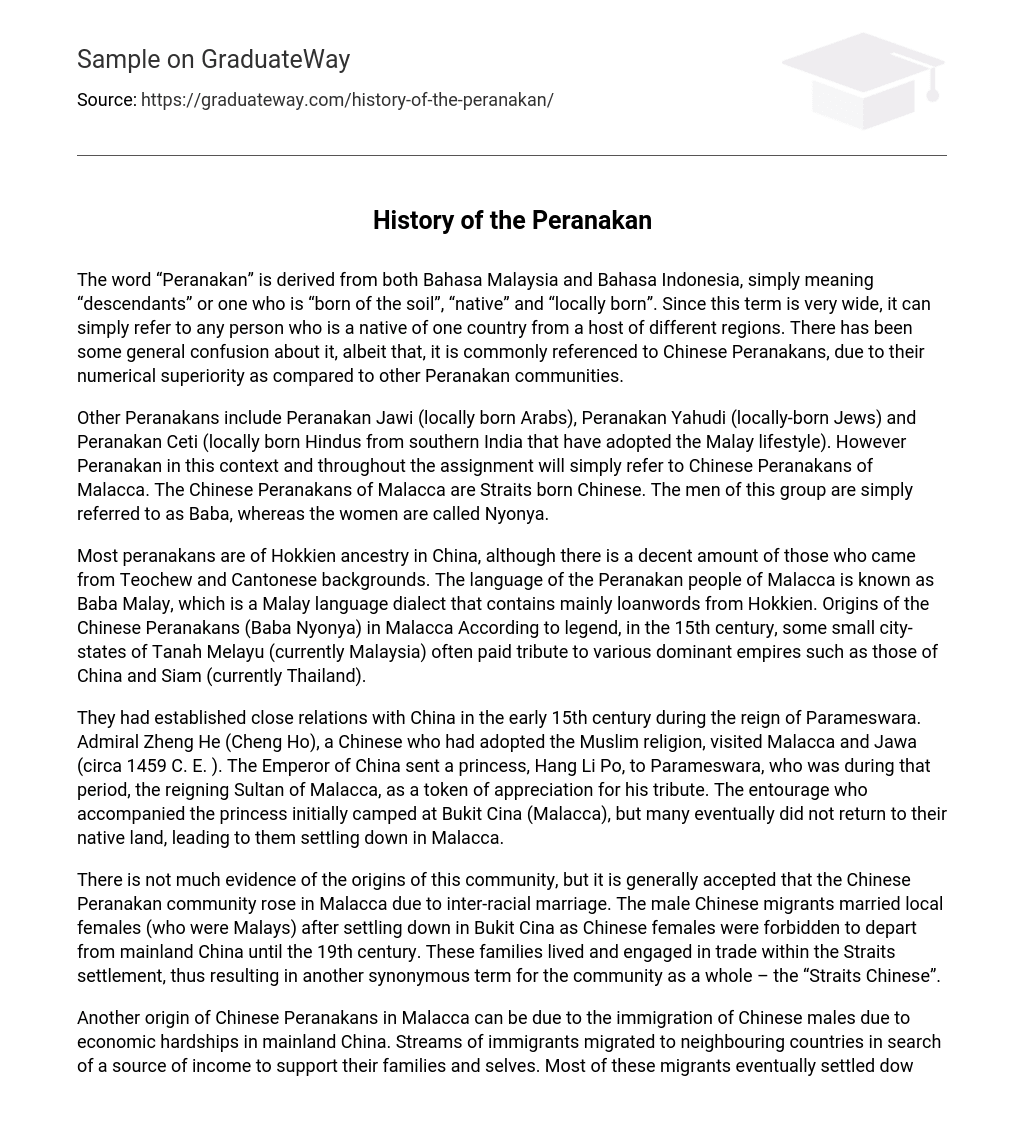The word “Peranakan” is derived from both Bahasa Malaysia and Bahasa Indonesia, simply meaning “descendants” or one who is “born of the soil”, “native” and “locally born”. Since this term is very wide, it can simply refer to any person who is a native of one country from a host of different regions. There has been some general confusion about it, albeit that, it is commonly referenced to Chinese Peranakans, due to their numerical superiority as compared to other Peranakan communities.
Other Peranakans include Peranakan Jawi (locally born Arabs), Peranakan Yahudi (locally-born Jews) and Peranakan Ceti (locally born Hindus from southern India that have adopted the Malay lifestyle). However Peranakan in this context and throughout the assignment will simply refer to Chinese Peranakans of Malacca. The Chinese Peranakans of Malacca are Straits born Chinese. The men of this group are simply referred to as Baba, whereas the women are called Nyonya.
Most peranakans are of Hokkien ancestry in China, although there is a decent amount of those who came from Teochew and Cantonese backgrounds. The language of the Peranakan people of Malacca is known as Baba Malay, which is a Malay language dialect that contains mainly loanwords from Hokkien. Origins of the Chinese Peranakans (Baba Nyonya) in Malacca According to legend, in the 15th century, some small city-states of Tanah Melayu (currently Malaysia) often paid tribute to various dominant empires such as those of China and Siam (currently Thailand).
They had established close relations with China in the early 15th century during the reign of Parameswara. Admiral Zheng He (Cheng Ho), a Chinese who had adopted the Muslim religion, visited Malacca and Jawa (circa 1459 C. E. ). The Emperor of China sent a princess, Hang Li Po, to Parameswara, who was during that period, the reigning Sultan of Malacca, as a token of appreciation for his tribute. The entourage who accompanied the princess initially camped at Bukit Cina (Malacca), but many eventually did not return to their native land, leading to them settling down in Malacca.
There is not much evidence of the origins of this community, but it is generally accepted that the Chinese Peranakan community rose in Malacca due to inter-racial marriage. The male Chinese migrants married local females (who were Malays) after settling down in Bukit Cina as Chinese females were forbidden to depart from mainland China until the 19th century. These families lived and engaged in trade within the Straits settlement, thus resulting in another synonymous term for the community as a whole – the “Straits Chinese”.
Another origin of Chinese Peranakans in Malacca can be due to the immigration of Chinese males due to economic hardships in mainland China. Streams of immigrants migrated to neighbouring countries in search of a source of income to support their families and selves. Most of these migrants eventually settled down in the said countries. Some maintained their Chinese customs and beliefs, while others embraced local customs while maintaining a degree of their own ancestral culture.
The latter is especially true for those who were involved in inter-marriages so that their children could get the “best of both worlds”. This resulted in a mix of Chinese and local practices in the community, creating rich fusion of culture and an identity of their own. These Peranakans later migrated between themselves to join other communities around Malaysia, Indonesia and Singapore (the Nusantara region). As a result, strong cultural similarities between the Chinese Peranakans exist in this region.





